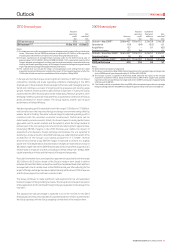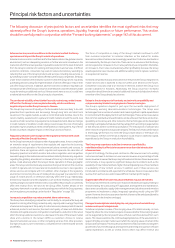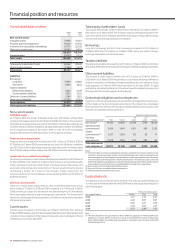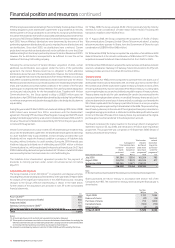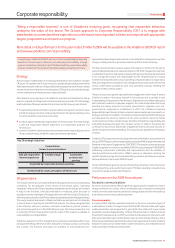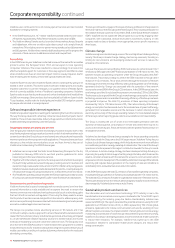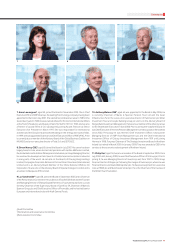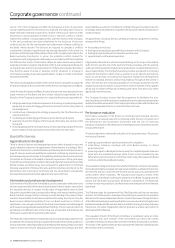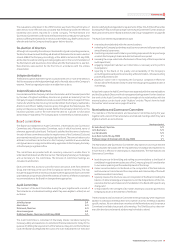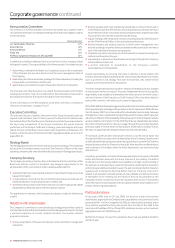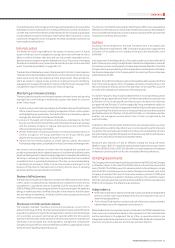Vodafone 2009 Annual Report Download - page 49
Download and view the complete annual report
Please find page 49 of the 2009 Vodafone annual report below. You can navigate through the pages in the report by either clicking on the pages listed below, or by using the keyword search tool below to find specific information within the annual report.
Performance
Vodafone Group Plc Annual Report 2009 47
Vodafone continues to address the reuse and recycling of handsets, accessories and
network equipment. The Group has worked with suppliers to ensure substances
prohibited by the Restriction of Hazardous Substances Directive are phased out. The
Group complies with the EU’s Waste Electronic and Electrical Equipment Directive
through its handset recycling programmes in all operating companies where it applies.
During the 2009 financial year, 1.82 million phones were collected for reuse and
recycling through collection programmes in 16 local operating companies, exceeding
the target of 1.5 million. 4,860 tonnes of network equipment waste was generated in
all operating companies, excluding India, with 97% of this sent for reuse or recycling,
exceeding the Group’s target of 95%.
Responsible business practices
Mobile phones, masts and health
Vodafone recognises that there is public concern about the safety of radio frequency
(‘RF ’) fields from mobile phones and base stations . The Group contributes to the funding
of independent scientific research to resolve scientific uncertainty in areas prioritised by
the World Health Organisation (‘WHO’). In 2006, the WHO identified the following
three main areas for additional research: long term (more than 10 years) exposure to
low-level RF fields, possible health effects of mobile device use in children and
dosimetry (the way levels of RF absorbed are calculated). There is comprehensive
access to relevant peer review and published scientific research reviews available at
www.vodafone.com/responsibility/mpmh.
Vodafone requires manufacturers of the mobile devices it sells to test for specific
absorption rate compliance with standards set by the International Commission on
Non-Ionizing Radiation Protection. Testing is carried out for use both against the ear
and against, or near, the body. Vodafone has been actively engaged with the
International Electrotechnical Commission Standards Organisation in developing a
new global protocol for testing phones for use against, or near, the body. This new
standard, which better reflects customers’ use of mobile devices, was approved by a
national committee vote in March 2009.
Vodafone continues to engage closely with local communities as par t of the planning
process for new masts. Fifteen operating companies undertake independent RF field
monitoring as part of an ongoing programme of community engagement. The
Group’s long term programme of engagement, with a range of stakeholders, aims to
reduce levels of concern amongst the public and to demonstrate that Vodafone is
acting responsibly. In surveys of external stakeholder opinion conducted annually
over the last three years, an average of 78% of respondents regarded Vodafone as
acting responsibly regarding mobile phones, masts and health.
Responsible network deployment
Vodafone’s mobile communication services rely on a network of radio base stations
that transmit and receive calls. Vodafone recognises that network deployment can
cause concern to communities, usually about the visual impact of base stations or
health issues concerning RF fields. During the year, the Group continued to track
compliance with its policy on responsible network deployment and with national
industry codes of best practice on network deployment. The Group has started to
audit first tier contractors to gain assurance of their adherence to Vodafone’s
responsible network deployment policy. A significant number of local operating
companies have already conducted site audits of their contractors and the overall aim
is to extend this programme across Vodafone’s footprint, including beyond first tier
contractors. However, the changing nature of Vodafone’s contractors’ footprint poses
a challenge to achieving this rapidly.
The Group also further developed its internal procedures leading to network
optimisation. By cooperating with other mobile communications operators to share
sites, the Group is reducing the total number of base stations required. This lowers
costs, enables faster network deployment and reduces the environmental footprint
of the network without loss of quality or coverage. The Group is now conducting
network sharing in all but one of its controlled markets.
Vodafone aims to comply with local planning regulations but is sometimes found to
be in breach. This is normally related to conflicting local, regional or national planning
regulations. During the 2009 financial year, excluding India, Vodafone was found in
breach of planning regulations relating to 492 of its 105,164 mast sitings. Fines levied
by regulatory bodies or courts in relation to offences under environmental law or
regulations were approximately £135,000.
Supply chain
During the 2009 financial year, Vodafone continued to implement its code of ethical
purchasing, which sets out environmental and labour standards for suppliers. During
the 2009 financial year:
65 strategic global suppliers have been assessed using the Group’s supplier •
evaluation scorecard in which CR accounts for 10% of the total. The scorecard
evaluates the supplier’s CR management systems, public reporting and approach
to managing their suppliers. Over the last three years, a total of 535 suppliers have
been evaluated using the scorecard.
18 site evaluations of high risk suppliers have been completed.•
82% of local strategic and preferred suppliers, excluding India, responded to a •
request for more information on the policies and programmes they have in place
to meet the requirements of Vodafone’s code of ethical purchasing.
The Group participated in the Carbon Disclosure Project supply chain initiative to
help increase its understanding of the risks and opportunities that climate change
presents to the supply chain and has added climate change requirements into the
Group’s supplier evaluation scorecard.
Social investment
The Vodafone Foundation and its network of 22 local operating company and associate
foundations have continued to implement a global social investment programme.
During the 2009 financial year, the Company made a charitable grant of £24.0 million to
The Vodafone Foundation. The majority of The Vodafone Foundation funds are
distributed in grants through operating company foundations to a variety of local
charitable organisations meeting the needs of the communities in which they operate.
The Vodafone Foundation made additional grants to charitable partners engaged in
a variety of global projects. Its areas of focus are: sport and music as a means of
benefiting some of the most disadvantaged young people and their communities,
and disaster relief and preparedness. In addition, operating companies donated a
further £18.0 million to their foundations and a further £2.9 million directly to a variety
of causes. Total donations for the year ended 31 March 2009 were £48.2 million and
included donations of £3.3 million towards foundation operating costs.
Key performance indicators(1)
KPI 2009 2008(2) 2007(3)
Vodafone Group excluding operations in India
Energy use (GWh) (direct and indirect) 3,124 2,996 2,690
Carbon dioxide emissions (millions of tonnes) 1.31 1.37(4) 1.18 (4)
Percentage of energy sourced from renewables 19 18 17
Estimate for operations in India(4)
Energy use (GWh) (direct and indirect)(5) 2,049 – –
Carbon dioxide emissions (millions of tonnes)(5) 1.90 – –
Number of phones collected for reuse and recycling (millions) 1.82 1.33 1.03
Network equipment waste generated excluding operations in India (tonnes) 4,860 4,287(4) 9,960
Percentage of network equipment waste sent for reuse or recycling excluding operations in India 97 96 97
Notes:
(1) These performance indicators were calculated using actual or estimated data collected by the Group’s mobile operating companies. The data is sourced from invoices, purchasing requisitions, direct
data measurement and estimations, where required. The carbon dioxide emissions figures are calculated using the kWh/CO2 conversion factor for the electricity provided by the national grid, suppliers
or the International Energy Agency and for other energy sources in each operating company. The Group’s joint venture in Italy is included in all years.
(2) The data for the 2008 financial year excludes operations in India and Tele2 in Italy and Spain.
(3) The data for the 2007 financial year excludes the newly acquired operations in Turkey and the operations in Japan that were sold during the 2007 financial year.
(4) Amounts related to the 2007 and 2008 financial years have been amended. Refer to the online CR report for further information.
(5) The data includes the network sites managed by Vodafone and the network sites managed by Vodafone’s joint venture, Indus Towers.


